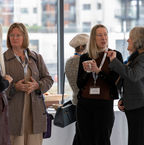DEM-COMM programme
Building Capacity in Dementia Research
DEM-COMM has been a successful capacity-building scheme for post-doctoral researchers working in applied dementia research.
The scheme launched on October 1st, 2022, with funding from the National Institute for Health and Care Research and the Alzheimer’s Society, and will run until March 31st, 2026.
The aim of DEM-COMMhas been to prepare a future cohort of researchers for the role of Chief Investigator in applied dementia research. This is an important and specialised role that carries with it the expectation that the lives of people living with (or at risk of) dementia will improve because of research.
The scheme supported the development of more than 70 early to mid-career researchers working in one of the 15 Applied Research Collaborations (ARCs) across England.
Read the full report Supporting the future generation of Chief Investigators in Applied Dementia Research
DEM-COMM is led by Professor Ruth Bartlett with ARC Wessex as the host and coordinating centre.
_jpg.png)
In 2026 we celebrated the end of the DEM-COMM programme at an event in Southampton - below are just some of the videos and images from that day
Southampton Test MP Satvir Kaur explains how important the work of the Dementia Fellows has been and how personal it is to her.
Lisa Hammond from the Alzheimer's Society who part funded the Dem-Comm fellowships praises their impact on the lives of people with dementia and their carers and families.

























Watch the DEMCOMM showreel created to celebrate all the hard work and achievements of the NIHR Dementia Fellows

